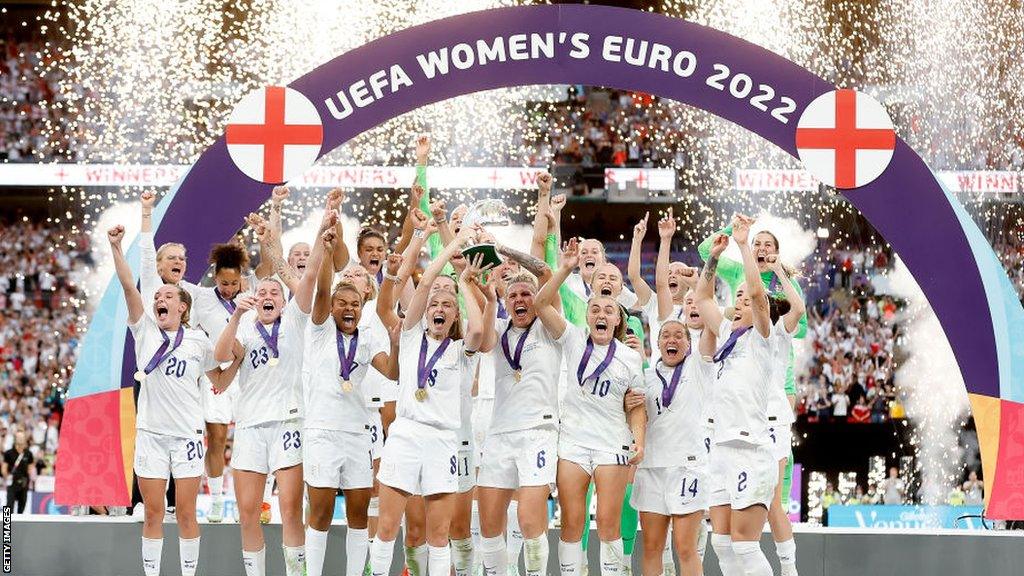Government's £600m package for school sport part of Lionesses 'legacy'
- Published

England created history by winning their first major women's tournament at Wembley last July
England captain Leah Williamson has welcomed a substantial government package which will seek to create equal school sport opportunities for girls.
Schools in England will be required to offer equal access to sports, including football, and deliver a minimum of two hours of physical education per week.
More than £600m of funding is to be delivered over two academic years.
It comes after the 23 members of England's Euro 2022-winning squad wrote an open letter to the government.
Williamson said the Lionesses wanted "to open the doors" for young girls as part of their legacy following last summer's success, beginning with changes in school sport.
"The success of the summer has inspired so many young girls to pursue their passion for football," said Williamson, who identified team-mate Lotte Wubben-Moy as a key driving force.
"We see it as our responsibility to open the doors for them to do so and this announcement makes that possible. This is the legacy that we want to live much longer than us as a team."
Wubben-Moy said: "By making football more accessible to millions of girls across the nation, we have opened a crucial door for the growth of women's football and women's sport as a whole. I am proud to be part of something that will live on for generations to come."
According to Football Association figures, only 67% of all schools and 41% of secondary schools offer football equally to girls in PE lessons, and only 46% of schools provide the same extracurricular opportunities as boys.
The funding package will encompass both school sport and after-school activities, while an additional £57m will be made available to open sport facilities outside of school hours and the School Games Organisers network will receive £22m.
Prime Minister Rishi Sunak said: "Last year the Lionesses' victory changed the game. Young girls know when they take to the pitch that football is for them and, thanks to the Lionesses, they too could be a part of the next generation to bring it home for their country.
"We want schools to build on this legacy."
The announcement coincides with International Women's Day, when more than 200,000 girls will participate in the FA's Let Girls Play events in schools across the country.
Schools which successfully deliver equal opportunities for girls and boys will be rewarded through the School Games Mark.
FA director of women's football Baroness Sue Campbell said "a conversation on the bus from the Trafalgar Square celebrations" was the catalyst for the Lionesses' desire to create a Euros legacy and she told BBC Radio 4's Today programme "it is just the beginning of the journey".
A former PE teacher, Campbell said: "It's a massive step forward. This is a landmark moment because our players drove it and we're really proud of them, but this is a real statement of intent that physical education and sport really matters."
England women's manager Sarina Wiegman said the move "is going to change society" and that she was "so proud" of her players.
"It says so much about them as human beings," said the Dutchwoman.
"They're fantastic football players but they are so much more than that. Their social conscience and trying to have a positive impact on society has brought us where we are today."
Former England player Jill Scott told BBC Radio 5 Live: "It makes us so happy to know that young girls won't have barriers that perhaps we did face when we were younger.
"To think that a young girl now will have equal access. An awful lot of the Lionesses have fallen in love with football at school."
FA chief executive Mark Bullingham said: "The magic of last summer's Euros victory can now live on with a legacy that has the ability to change the future of women's football and positively impact society."

Release or detain? A raw documentary goes inside the high stakes world of parole hearings
Go Hard or Go Home: Eight Britons face brutal workouts and terrifying challenges
